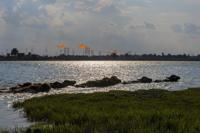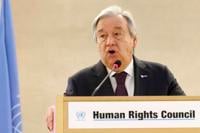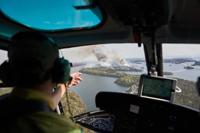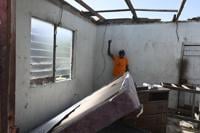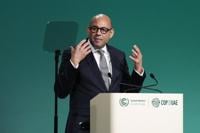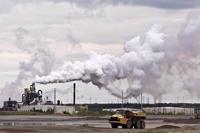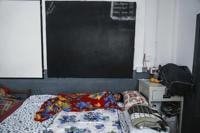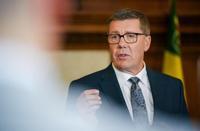BAGHDAD (AP) — A multibillion-dollar agreement signed with France's TotalEnergies could help resolve Iraq's longstanding electricity crisis, attract international investors and reduce its reliance on gas imports from neighboring Iran, a point of tension with Washington.
The $27 billion agreement signed in Baghdad on Monday after years of negotiation marks the largest foreign investment in Iraq's history. It could even help combat climate change by reducing oil flares, and relieve some of through a new desalination plant.
But that's only if the parties implementing the agreement can overcome the endemic corruption and political instability that has undermined Iraq's oil sector for more than two decades.
The Gas Growth Integrated Project focuses on bolstering the country’s oil-rich but underdeveloped Basra province. TotalEnergies would take on a 45% stake in the Basra Oil Company, with Iraq holding 30% and taking the other 25%.
It would from three oil fields and use it to generate electricity. Because Iraq lacks the necessary infrastructure, that gas is currently being burned off into the atmosphere. The World Bank estimates Iraq flares around 16 billion cubic meters of gas per day.
The project also includes the construction of a seawater treatment plant that would relieve the pressure on Iraq's water resources, and a solar power plant to be built with Saudi Arabia's ACWA Power that would supply the local grid.
Iraq is an OPEC member with some of the world's largest oil reserves. But its electricity grid has suffered from decades of mismanagement and damage from various conflicts. Power outages are common, , forcing many Iraqis to rely on diesel generators or suffer through temperatures that exceed 50 degrees Celsius (122 degrees Fahrenheit).
Iraq also relies heavily on gas imports from Iran, with which it has had close ties since the 2003 U.S.-led invasion. The U.S. has been forced to grant some exceptions to the sanctions it maintains on Iran over that country's disputed nuclear program. Budgetary shortfalls and surging demand have meanwhile forced Iran to reduce the supply in recent years, compounding Iraq's woes and .
Iraq's energy problems .
The power-sharing arrangement set up in the wake of the U.S.-led invasion divides the state and its institutions along religious and ethnic lines. Sectarian-based political parties bicker over ministries, install loyalists at top positions and dispense public sector jobs to their supporters. The system breeds , inefficiency and political gridlock.
ExxonMobile, which saw a similar multi-project deal fall through after years of negotiations, announced in 2021 that it would be selling its shares from the West Qurna 1 oil field. London-based BP is spinning off development of the Rumaila field, Iraq’s largest.
Iraq signed an initial contract with TotalEnergies in 2021, but political disputes delayed the final signing for another two years.
TotalEnergies CEO Patrick Pouyanné nevertheless struck an upbeat tone at the signing ceremony, saying the agreement would boost Iraq's economy and create jobs, with Iraqis making up at least 80% of the project's workforce.
“It’s a very strong signal, not only to TotalEnergies to encourage to invest, but also to all other foreign investment,” he said in a statement. The company did not respond to several requests for additional comment.
The state-run Iraqi News Agency said work would begin “in a matter of days," with the Oil Ministry expecting tangible results in three years.
Oil Ministry spokesman Assim Jihad said the ministry has been trying to launch such projects for over a decade but was held back by political gridlock, the COVID-19 pandemic and the war against the Islamic State extremist group, which at one point controlled much of northern and western Iraq.
“Now there is political will to speed up implementing these kinds of projects," he said.
Bachar El-Halabi, an energy markets analyst at London-based Argus, says the megaproject “gives the country a breather” after recent years saw some oil majors pull out of Iraq.
“This should, in theory, help decrease Iraq’s dependency on Iranian gas imports, which remains a sticky point between Baghdad and Washington," he said.
Marc Ayoub, an energy policy expert at the Tahrir Institute for Middle East Policy, a Washington-based think tank, said the project could face challenges down the line.
“The political climate in Iraq is sensitive and could change at any moment,” he said.
The size of the project, and the involvement of a major multi-national company, means “there would be less room for corruption,” he added. “But you never know. There's always risk.”
___
Chehayeb reported from Beirut.


